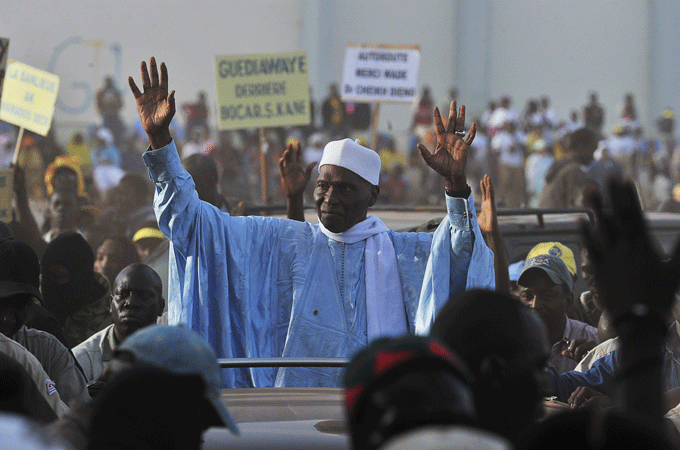| Tensions build in run-up to Senegal vote | ||
Demonstrations in Dakar as protest movement and opposition candidates call on President Wade to drop bid for third term. | ||
While it is business as usual for most in Dakar, an air of uncertainty hovers over the coastal city, the site of daily protests and demonstrations as opposition parties struggle for space to campaign for Sunday's elections. Olusegun Obasanjo, the former Nigerian president, on an observer mission to the West African country, continued to meet opposition leaders on Thursday in a bid to find a solution to their resolve that Abdoulaye Wade, the incumbent president, is not legible to run for a third term. The Senegalese constitution prohibits incumbent presidents from serving more than two terms, but the country's highest court, the constitutional council, validated Wade's candidacy on January 27, saying that his first term did not count since it came before the two-term limit was introduced. The court's decision has outraged many Senegalese citizens, resulting in a series of demonstrations and clashes between opposition supporters and police services. The M23 movement, an umbrella grouping of activists, opposition leaders and youth called the ruling "a constitutional coup". The interior ministry has banned rallies at Independence Square, and conducted a severe crackdown on opposition rallies in various parts of the city. It is a move that prompted Idrissa Seck, a leading opposition candidate, to describe Senegal to Al Jazeera, as a "dictatorship". Calls for revolution Earlier in the week, protesters marched through Avenue William Ponty, close to Independence Square, singing and chanting: "He should go! He must go! He has to go!" in reference to Wade. Protesters waved Senegalese flags and held up placards reading ''Rend Toi" ["You have to surrender" in French], and "Na Deem" ["Must go" in Wolof] and "Wade D'ena" ["Wade is dead" in Wolof] and calling for a "Senegalese revolution", under the watchful eye of a thick security presence. In a crowd dominated by young males, one older protester in his 40s, told Al Jazeera that he was at the rally to support the M23 movement against "President Wade's attempt to put his son in power". Wade is widely believed to be grooming his son, Karim Wade, a powerful government minister, as his preferred successor.The crowd dispersed when riot police used grenade launchers to fire tear gas canisters into the crowd, prompting a stand-off between rock-wielding demonstrators and armed security forces.Another younger demonstrator screamed: "We are tired, we are tired of his policies and wastage of funds!" Clashes between security forces and protesters have already resulted in at least six deaths, according to an official toll, though others suggest that the number has crept up to 10 deaths, since the constitutional council validated Wade's candidacy. While the African Union delegation through the leadership of Olusegun have tried to address the crisis, analysts say it is difficult to see past the political stalemate. "It is a stalemate. On one hand, Wade is obstinate and is at least 90-years-old, meaning that if he wins we would have a president that would finish his term at 97-years-old," Arame Tall, a researcher at John Hopkins University-Sais, told Al Jazeera. Wade is officially 85 years old but is rumoured to be older. "On the other hand, we have a highly divided opposition, animated by personal ambition - and they are also guilty of trapping the public because they simply refuse to unite and create a strong front to confront the old man. "The public has no choice, because they are faced with an old man they do not want and a fragmented opposition with no leadership," Tall said. Regional parallels Observers are at a stretch to draw comparisons and parallels between the West African country and others in the region, though there are repeated murmurs that Senegal might by headed the way of botched elections and a possible violent standoff, as occurred in Ivory Coast following disputed elections in 2010. But security experts in the region say that the assertion is unjustified and that though security might deteriorate, the country has very little in common with Ivory Coast. Around dusk on Wednesday, as informal traders and businesses prepare to close, opposition leaders could be seen driving on the corniche in their motorcade - blaring the signature anti-Wade songs on stacked speakers aboard flat deck pick-up vehicles. But fears of violence remain high, and can be seen in the drawn shutters of department stores and cafes on some of the commercial avenues in Dakar as business lament losses and potential risks to property if the situation turned hairy. There is also fear that pre-election violence could hurt voter turnout on Sunday, prompting calls from some candidates to delay the polls. "People are going about their usual activities, but it is very stressful for locals because no one knows what might happen," Arame Tall said. |
We are there for people who do not access to digital content by creating a space for them to join . where they can get hot news , sport, advises and entrepreneur stuff We are there for people who do not access to digital content by creating a space for them to join . where they can get hot news , sport, advises and entrepreneur stuff. we are the only English media in the east of the DRC
Friday, February 24, 2012
Subscribe to:
Post Comments (Atom)
Featured Post
RDC-Election : élections en 2017 ou sanctions de l’UE
Comme annoncé il y a quelques jours, les ministres des Affaires Etrangères des 28 Etats membres de l’UE (Union Européenne) s...

-
NSK Olimpijs’kyj — Kyiv (Kiev) Match : Spain – Italy Preview,live stream,Prediction,Highlights Referee: Pedro Proença After 30 game...

No comments:
Post a Comment
hey! whats up! we are happy to attend that lever we need your help by contribute with idea and other things. thank you